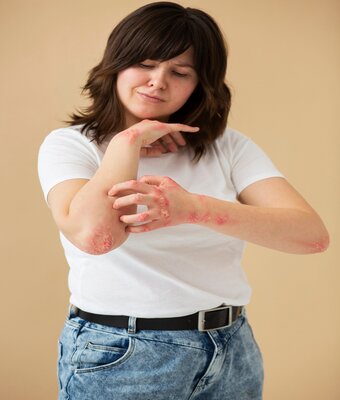
The Impact of Hay Fever on Skin Health
When you think of hay fever, you probably picture sneezing, a runny nose, and itchy eyes. But did you know seasonal allergies can also take a toll on your skin? If you’re prone to hay fever, you might also notice flare-ups of eczema, hives, or general skin irritation—especially during peak pollen seasons.
The Link Between Hay Fever and Skin Reactions
Hay fever happens when your immune system overreacts to pollen from trees, grass, or weeds. While it mainly affects your nose and throat, it can also trigger skin issues. Many people experience:
- Red, itchy patches that feel irritated;
- Blotchy spots or hives after being outdoors;
- Worsening eczema symptoms during allergy season.
This happens because pollen doesn’t just enter your body through the air—you can also react to it through direct skin contact. If you’ve ever noticed your skin feeling itchy after a walk in the park, pollen could be the culprit. The good news? Targeted skin allergy treatments can help keep these reactions under control.
Can Pollen Make Eczema Worse?
Absolutely. Even if you don’t have hay fever, pollen exposure can still irritate your skin. Many eczema sufferers find that their symptoms get worse after gardening or spending time in grassy areas. If your skin flares up during certain times of the year, pollen could be an unexpected trigger. Managing your environment—like showering after outdoor activities and using a gentle, fragrance-free moisturizer—can help minimize irritation.
Watch Out for Allergy Medications That Affect the Skin
One thing many people don’t realize? Some allergy treatments can cause skin reactions. If you notice a rash around your nose after using a nasal spray, or if antihistamines seem to dry out your skin, your medication could be playing a role. If this happens, switching to a different option or adjusting your skincare routine may help.
Need Expert Help?
If seasonal allergies are making your skin miserable, a dermatologist can help pinpoint what’s triggering your reactions—and find solutions that work for you. Book a consultation with our London dermatologists today to get personalized advice and relief.
FAQ
Can hay fever cause skin irritation even if I don’t have a diagnosed pollen allergy?
Yes, hay fever’s allergenic impact on the skin can affect individuals without diagnosed pollen allergies. Even those who don’t experience traditional hay fever symptoms can develop skin reactions due to pollen exposure.
Is there a connection between hay fever and skin conditions worsening during certain seasons?
Absolutely, individuals with conditions like eczema might notice worsened symptoms during seasons when pollen is prevalent. Pollen exposure, particularly from certain plant types, could contribute to the exacerbation of skin conditions.
How can I determine if my skin rash is a result of hay fever medication?
If you notice an itchy rash around the nasal area following the use of hay fever medication, it could be related to the medication. Consulting a medical professional, like our London dermatologists, can help you identify the cause and explore alternatives if needed.
Can skin reactions occur through indirect contact with pollen?
Yes, pollen’s impact on the skin can extend beyond inhalation. Direct contact with pollen-laden surfaces, plants, or even objects can trigger skin reactions, emphasizing the need for awareness and appropriate preventive measures.
Are there any specific plants that commonly trigger skin reactions related to hay fever?
While various plants can trigger skin reactions, some common culprits include grasses, ragweed, and certain trees. Understanding which plants are prevalent in your environment can aid in taking proactive steps to minimize exposure.


